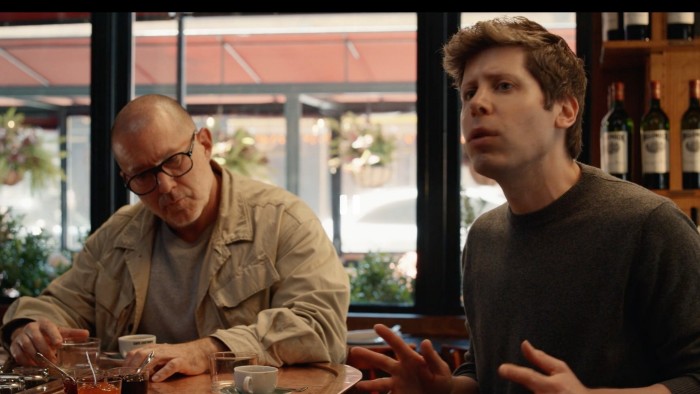Unlock the Editor’s Digest for free
Roula Khalaf, Editor of the FT, selects her favourite stories in this weekly newsletter.
The chief executive of a start-up that forced OpenAI and former Apple design chief Sir Jony Ive to pull down marketing materials about their $6.4bn AI device venture has accused them of trying to “bury” his firm after discussing a potential investment.
iyO founder and former Google executive Jason Rugolo told the Financial Times he had been “blindsided” by the launch of io, OpenAI’s partnership with Ive to create new AI hardware products, as both companies had previously been in deal talks with his similarly named start-up.
“This is a story of corporate aggression, of large companies trying to bury smaller companies,” said Rugolo. “If we didn’t win the restraining order, this announcement very well could have killed us.”
The trademark dispute comes just a month after OpenAI revealed plans to acquire Ive’s hardware start-up, in a bet on alternatives to the smartphone as the dominant device to access AI.
Over the weekend, OpenAI removed a blog post and short video about the deal, following a restraining order by a US federal judge on Friday. OpenAI and LoveFrom, Ive’s design firm, have denied any intentional trademark infringement or wrongdoing.
“It totally blindsided me: the announcement of a company doing a similar thing with the exact same name,” Rugolo said. “They know what they are doing.”
OpenAI said: “This is a baseless trademark dispute and not a case about stolen ideas or technology. iyO demoed a product in May 2025 that didn’t function properly or meet our standards in hopes that we’d acquire iyO. We passed. Jason Rugolo was also well aware of the io name and never raised concerns before our announcement.”

iyO, spun out of Google’s Moonshot lab in 2021, has designed AI earbuds named “iyO ONE”, offering what it calls the next wave of consumer hardware. The so-called ‘audio computers’ have conversational voice assistants plugged into a suite of apps.
In a lawsuit filed this month, iyO details how OpenAI’s vice-president of product, Peter Welinder, met the start-up twice after Rugolo got in contact with Sam Altman in March. Welinder introduced them to one of Ive’s engineers, a former top Apple design executive called Tang Yew Tan.
Tan requested that several team members try out the device, according to emails disclosed in the suit. Tan, Welinder, and Evans Hankey — the former Apple design chief who joined Ive at io — met with iyO again in May for a presentation of its product, according to the lawsuit.
“The context of those meetings was an acquisition,” said Rugolo. “They were talking about buying our company. They got everything, right down to how the software stack works. I foolishly trusted them, because I thought we were collaborating and serious about working together.”
The meetings came three years after an initial round of contacts. In April 2022, iyO said it met Ryan Cohen, an executive at Altman’s personal investment fund Apollo Projects, and LoveFrom team member and former Pinterest co-founder Evan Sharp. Both passed on investing at the time.
In a statement to the court, Altman said he was not aware of Rugolo or his company in 2023 when io was founded, adding that Rugolo emailed him “out of the blue” in March of this year seeking $10mn in funding. Altman said he passed Rugolo on to the io team “as a courtesy” and to “evaluate any opportunities for collaboration.”
In his court statement, Tan said he had agreed to meet Rugolo as a favour to a friend, that the demonstration of iyO ONE had failed, that he had refused offers to review the company’s intellectual property, and that Rugolo “seemed desperate for cash”.
Tan claims in the court filings that Rugolo offered to sell the company for $200mn, with Rugolo “raising the issue of the io name in bad faith to try to force a deal with his company.”
Rugolo told the Financial Times this statement was “100 per cent false” but could have arisen from a misunderstanding, since he was raising capital with a “SAFE” cap of $195mn — an upper limit on the company’s valuation.
Rugolo said his start-up had been trying to raise new funding this year as it looked to make a limited launch of 20,000 devices, but said the io announcement had hurt discussions.
“It’s hard enough to raise money without any competition, and then when you’re trying to get hardware funding, which is notoriously difficult [given the existing large industry players]- it’s already really hard,” said Rugolo.
The defendants — io products, OpenAI, Altman and Ive — argue that the suit is “premature”, as io is “at least a year away from offering any goods or services” so there is “no io product or marketplace context to evaluate”. The defence added that io’s first product “is not an in-ear device like the one [the] Plaintiff is offering”.
The trial in the case is scheduled for January 2028, with a preliminary injunction hearing set for October this year to determine whether the trademark infringement ban will continue.



